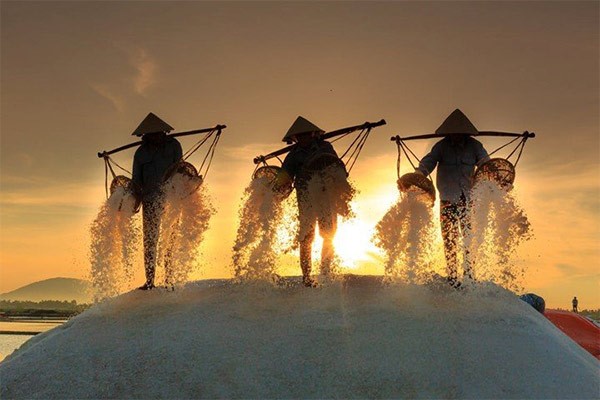What is industrial salt and what is its use?


Some mistakenly believe that the only salt in the world is the white substance that makes our food salty and flavorful! However, it should be noted that these minerals are diverse and have various uses. From blue salt to pink salt and sea salt, they have incredible properties and are used in food. Additionally, other substances known as Industrial salt are used in industries and construction. If you’re unsure what industrial salt is and what its applications are, we recommend you carefully read this article from Blue Salt.
Industrial salt is actually a substance that has a lower purity compared to table salt, is not refined, and contains no iodine. The purity of table salt and blue salt is about 99%, but industrial salts are used in industry without any purification or refinement! As a result, they are not edible. Many factories and businesses use industrial salts, contributing to the growth of industries. In the following sections, we will explain how this type of salt is produced and its uses.

In answering the question of what industrial salt is and what it is used for, we now turn to how it is produced. Industrial salt is obtained in two ways: 1) directly from seawater, 2) from sedimentary rocks left over from the evaporation of seawater. Salt is classified by purity when extracted. If the purity of the salt is high, like Himalayan pink salt, it is used for consumption, but if the purity is low, it becomes industrial salt. In our country, provinces like Fars, Semnan, Qom, and Markazi are among the largest producers of industrial salt.
Nowadays, most industries are dependent on industrial salt, from drilling and setting up specialized rigs to creating pharmaceutical capsules. In snowy days, traffic officers spread industrial salt on roads to ensure the safety of drivers and passengers. By lowering the freezing point, salts prevent road freezing. Fortunately, in our country, alongside the Blue Salt mines, there are also abundant industrial salt mines. In the following sections, we will introduce different types of industrial salts.

Powdered industrial salt, or soft salt, commonly known as road salt, is made by grinding large blocks of industrial salt. Due to the high similarity between this material and table salt, it is important to be cautious when buying and using it. The fine grains of this salt quickly absorb moisture from the air, which is why it solidifies into a hard rock when exposed to the air. Soft (powdered) industrial salt is used in poultry feed, making nuts, de-icing roads, producing chlorine gas, manufacturing acids, and making paper.
When seawater evaporates under sunlight, coarse grains of this salt remain on the ground. If there are any impurities, moisture, or contaminants, the salt is washed. The water treatment and snow and ice removal industries make the most use of this type of industrial salt.
This industrial salt has the most applications. The metal melting industry, textile processing, chemical production, ion exchange water treatment, leather production, paper and pulp manufacturing, and making industrial brines are all accomplished using this type of industrial salt.
Seawater and lake water evaporate under the sun, leaving salts that are widely used in industry. Dyeing fabric, creating resin products, producing various detergents (from laundry powder to dish soap and soap), and many chemical processes are done using industrial ground salt.

Industrial fishery salt is another type of industrial salt. As the name suggests, it has extensive use in fisheries and fish catching. The size of this salt is around 5 to 9 millimeters and is produced by crushing larger rocks. Factories producing and distributing salt identify suitable salt for the fishery industry and use appropriate devices for crushing, grinding, and milling fishery salt. Regenerating inactive resins, disinfecting water, removing water hardness, precision filtration, and tanning are some of the uses of fishery salt.
The grain size of this type of industrial salt is similar to sugar, which is why it is called sugar-like salt. Drilling salt has the most applications in various industries and factories. It is used in curing meats, producing Liqvan cheese, and drilling muds.
In this article, we’ve discussed what industrial salt is and what it is used for. Most factories and industries around the world use various types of industrial salt. Factories producing caustic soda, sodium carbonate, and chlorine gas are among the main industries that consume industrial salt. Glass manufacturing, cosmetics and medical products, plastic production, tanning, textiles, particle board production, leather production, animal feed production, boilers, chemical industries, water hardness treatment, and resin regeneration are some of the major industries that use industrial salt. Since the grain size of salt is different for each industrial occupation, factories distributing industrial salt are required to perform operations like grinding, milling, and crushing industrial salt rocks.
Industrial salt is a type of salt with lower purity compared to table salt, it is unrefined and does not contain iodine.
Because industrial salt contains high amounts of impurities and is not refined, it is not edible.
Industrial salt is produced in two ways: 1. It is obtained from seawater. 2. It is derived from sedimentary rocks left behind by the evaporation of seawater.
User Reviews